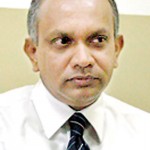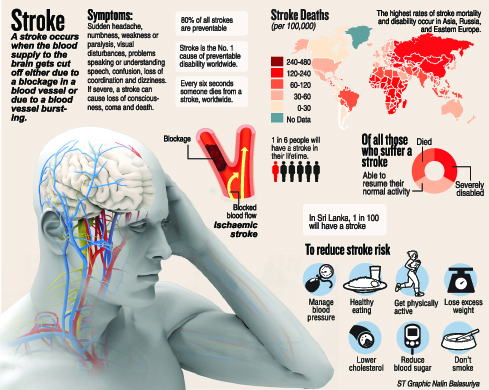Sri Lanka facing virtual epidemic of stroke
Consultant Neurologist Dr. Udaya Ranawaka discusses the importance of awareness, prevention and treatment of this life-threatening disease as the ‘Bill of Rights of Stroke Patients’ is to be launched here on World Stroke Day
Epoch-making it will be for Sri Lanka, when on Wednesday, the ‘Bill of Rights of Stroke Patients’ will be launched in Colombo to mark World Stroke Day.

Dr. Udaya Ranawaka
Following the lead of the World Stroke Organisation which made public the ‘Bill of Rights of Stroke Patients’ in Istanbul, Turkey, last week, Health Minister Maithripala Sirisena will present this signal document in Sinhala and Tamil on October 29.
“The ‘Bill of Rights of Stroke Patients’ has been developed by patients and care-givers about what they need from society,” said the President of the National Stroke Association of Sri Lanka (NSASL), Consultant Neurologist Dr. Udaya Ranawaka.
The launch of the ‘Bill of Rights’ by the Health Ministry in collaboration with the NSASL underscores Sri Lanka’s commitment to further strengthen measures not only to prevent but also effectively treat stroke.
Stroke which not only kills but leaves a large number severely debilitated, is a disease that needs to be on the mind of all – the authorities as well as the public, for the statistics are grim.
Of all those who suffer a stroke, 1/3rd will die, 1/3rd will be severely disabled and it will only be 1/3rd who will be able to resume their normal activity, the Sunday Times learns.
 While 1 in six will develop a stroke and every other second someone somewhere is having a stroke, Sri Lanka needs to take extra care. For in Sri Lanka, 1 in 100 will have a stroke, according to two separate community-based studies done here.
While 1 in six will develop a stroke and every other second someone somewhere is having a stroke, Sri Lanka needs to take extra care. For in Sri Lanka, 1 in 100 will have a stroke, according to two separate community-based studies done here.
“Sri Lanka has one of the highest stroke prevalence rates in the world,” points out Dr. Ranawaka who is also a Senior Lecturer at the Faculty of Medicine, University of Kelaniya.
There is double jeopardy for Sri Lanka because it also has one of the fastest ageing populations in the world and is grappling with a dramatic increase in risk factors for stroke with a higher incidence of non-communicable diseases (NCDs), it is learnt.
“We are facing a virtual epidemic of stroke,” says Dr. Ranawaka, asking whether as a country we are ready to meet this enormous challenge?
“No,” would be the answer, but everything is not gloom and doom, he says, assuring that urgent measures are being taken to improve acute care services to provide the best possible care for people who develop stroke.
The key is to have stroke units, according to him. Currently there are only seven stroke care units, with four in the Western Province and three elsewhere. There are fewer than 50 dedicated stroke beds for a population of over 21 million.
To further strengthen services, the NSASL is working closely with the Health Ministry including Director-General Dr. Palitha Mahipala, to develop more stroke units next year.
Another vital need is dedicated rehabilitation units within hospitals themselves to deal with disabilities on a long-term basis, says Dr. Ranawaka.
As part of the World Stroke Day activities, the NSASL established 13 years ago, is working concertedly to train health professionals and care-givers on the essential multidisciplinary team approach for stroke-sufferers which would bring about better outcomes.
“Stroke is one condition where the multidisciplinary team approach can be exemplified. Neurologists, nurses, mental health workers, therapists of many disciplines including physio, occupational and speech and also social workers need to work in tandem not only during treatment but also long-term rehabilitation,” says Dr. Ranawaka.
This is why the NSASL will hold 15 seminars for health-care professionals in all provinces, to drive home the importance of the multidisciplinary approach.
Meanwhile, the NSASL is also having many programmes including the distribution of compact, easily understandable and informative booklets on stroke in English, Sinhala and Tamil on its prevention and treatment.
“People need to recognise the symptoms of stroke early and act quickly by bringing the stroke-sufferer to hospital immediately,” urges Dr. Ranawaka, adding that minimising the risk factors of stroke is also important.
To minimize the chance of developing a stroke, one needs to have a healthy lifestyle by stopping smoking, cutting down on excess alcohol, engaging in physical exercise, having a healthy diet and keeping to an ideal body weight, he says.
The other side of the same ‘prevention coin’ is controlling disease conditions such as diabetes, hypertension, heart disease and high cholesterol, adds Dr. Ranawaka.
| What you can do
What can the public do to support the battle against stroke and further improve stroke-care in Sri Lanka? For the second consecutive year, popular band, ‘Flame’ in all its magnanimity, will hold the concert, ‘Journey’ to generate funds for the NSASL and people can support the stroke-cause by buying a ticket to enjoy this beautiful music. ‘Journey’ will be held on November 9 at the Bishop’s College auditorium. People could also send their mite to the NSASL’s Account No. 003010396203 in the name of the National Stroke Association at the Hatton National Bank – Head Office, 479, T.B. Jayah Mawatha, Colombo 10. The NSASL may be contacted at No. 6, Wijerama Mawatha, Colombo 7. Tel: 011-2682630 or e-mail: nationalstroke@gmail.com |


